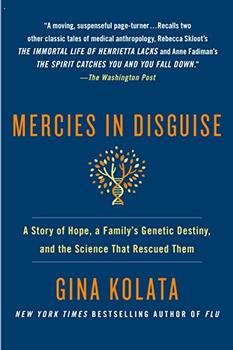Summary | Excerpt | Reading Guide | Reviews | Beyond the Book | Readalikes | Genres & Themes | Author Bio

A Story of Hope, a Family's Genetic Destiny, and the Science That Rescued Them
by Gina Kolata
Soon, the motions became automatic. So he paid little notice to the plump gray-haired woman from the nearby town of Darlington when she made her way up to him, one of so many in that sea of mourners.
"I am so sorry for your loss."
Now her eyes turned down, her smile faded slightly. She looked up at him again, holding his glance meaningfully.
"I remember his daddy walking through the plant. He had to hang on to the machines."
This seemingly innocuous comment was delivered so quietly that she had already moved on by the time Tim recognized its meaning.
Throughout his father's illness — abrupt in its onset and unswerving in its course — Tim Baxley had sought answers from one doctor after another — general practitioners, pathologists, neurologists. And he'd never received one that satisfied him. His father, doctors said, suffered from a rare, anomalous disease, kind of a blend of Alzheimer's and Parkinson's, but his was a case like none any of them had ever seen or heard of before. And yet, suddenly, in the briefest of exchanges, this woman had conveyed that she had seen it before in his grandfather — a crucial detail Tim had never known. That loss of balance, it was one of the first signs, wasn't it?
Standing there in the funeral home, Tim was barraged by memories and images, one after the other. His dad shuffling as he walked; soon the shuffling turned into stumbling and then sort of weaving, like he was drunk. The way his father careened through the living room, clutching at the wall for support, hanging on to chairs and sofas. And that was in the beginning, when things just seemed off, but nothing so strange that it could suggest a fatal problem.
Bill's memory seemed to slip around this time as well. Tim had first noticed it 10 years earlier, in 1988, at Sunday dinner at his parents' house. He had been looking for something in the basement when he came upon an object from his childhood. Bill had fought in the Pacific — but one of his friends, who had fought in Europe, had given him a compass that he had snagged from a German general. It had a steel case that opened to reveal the compass; on the other side, there was a little mirror with the initials of its owner etched on it.
Tim would often bring this to his father and ask him to talk about the war, to tell the story of his friend and how he came to get his hands on that compass. That night, Tim cradled the little compass in his hand, carrying it upstairs to the kitchen. He proudly showed it to his father. Like a small child, he wanted to hear his dad tell the story one more time. It had been years since he had asked him about it.
But when Bill looked down at what his son was holding, he seemed baffled and muttered that he had no idea what Tim was talking about. Tim reminded Bill that they'd looked at that compass many times over the years. No, Bill shot back, he didn't remember any of that.
Tim sadly trudged back downstairs clutching the compass and replaced it on the shelf — it may still be there to this day. He was devastated.
Tim, who had followed Buddy by going to medical school and was now himself a doctor, was furious at what he saw as a major failing among those in his profession. Some doctors, he said to his brother Mike, retreated behind a wall of dispassion when confronted with difficult-to-diagnose patients like their dad; he'd seen this happen before with his professors in medical school and occasionally among colleagues.
The Baxley brothers — realizing they were likely not going to find a medical authority to guide them — felt compelled to do something, to find an answer. It was devastating to watch their father helplessly deteriorate with no authority figure in sight, no expert to guide them through these mystifying circumstances. The doctors who examined their father had only made his suffering worse with their breezy dismissal of his terrifying symptoms, with their clearly inaccurate diagnoses and lack of compassion.
From Mercies in Disguise by Gina Kolata. Copyright © 2017 by the author and reprinted by permission of St. Martin's Press.
Your guide toexceptional books
BookBrowse seeks out and recommends the best in contemporary fiction and nonfiction—books that not only engage and entertain but also deepen our understanding of ourselves and the world around us.